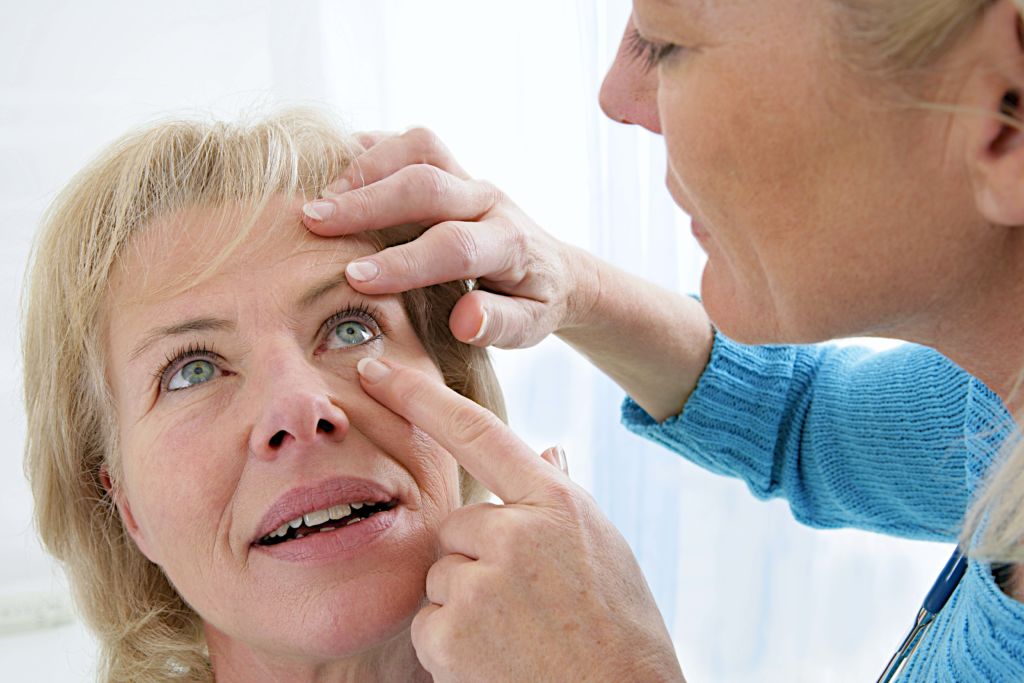Changes to your vision are common as you get older. You may find yourself needing glasses to read the newspaper, or noticing that your vision gets blurry or your eyes feel dry. It’s a normal part of aging, but there are things you can do to detect and prevent age-related eye problems to ensure healthy vision well into your later years.
Age-Related Eye Diseases
There are several diseases that can affect your eyes as you get older:
Age-related macular degeneration
Age-related macular degeneration (AMD) is actually the leading cause of blindness in the industrialized world, as London Drugs Pharmacist Gianni Del Negro discussed in a recent Global News spot. Cells in our eyes naturally break down and create waste products, but in people with AMD the process to flush them out gets slowed down. Those waste products stay in the eye, causing blurred vision and eventually vision loss.
Cataracts
Cataracts are cloudy spots on the lens of the eye. Most cataracts are related to aging, and they can develop slowly over time so you may not notice during the early stages of the disease. Cataracts are the second leading cause of blindness in Canada, but they can be treated quite effectively with surgery.
Diabetic Retinopathy
Diabetic retinopathy is a complication of diabetes. It’s caused by damage to the small blood vessels connected to your retina, the light-sensitive membrane at the back of your eye. If you have diabetes, it’s very important to get a yearly dilated eye exam.
Glaucoma
Glaucoma is a group of eye diseases that affects the optic nerve. It most commonly occurs when pressure inside the eye is too high due to a backup of fluid, but it can also result from an injury or infection in the eye.
Dry Eye
Dry eye is very common as we age. As we get older, our body may produce lower quality tears. Tears are distributed across the cornea every time we blink, protecting our eyes from the environment outside. When tear production is reduced, we lose that protective layer of liquid. Dry eye can feel like a stinging or scratchy feeling in the eye and can lead to blurred vision.
Eye Care Tips
While there are many diseases that can affect your eye health as you age, most are preventable or treatable.
Eye Exams
Yearly eye exams are key to prevention, even if you’re not experiencing vision problems. Some diseases like glaucoma or diabetic retinopathy can be spotted early and thus treated more quickly. In a dilated eye exam, your eye doctor will put drops in your eyes that cause your pupils to dilate so they can see through to your retina at the back of your eye. They may also use a puff of air to flatten your cornea to test your eye pressure.
Healthy Lifestyle
You can reduce your risk of AMD by 50% by quitting smoking, controlling your blood pressure, and maintaining a healthy body weight. Your eyes are like the rest of your organs; your diet and exercise habits have an effect on them as well.
Sun Protection
Protecting your eyes from the sun is essential. Wear sunglasses with UV protection. You can further reduce potential damage to your eyes by wearing a brimmed hat in the sun.
Multivitamins
Taking multivitamins and eating antioxidant-rich foods can help your eye health. Studies have shown certain combinations of antioxidants and vitamins slow down the progression of AMD. Some multivitamins like Vitalux are specifically formulated with eye health in mind.
Eye Drops
Eye drops can help with dry eye or other eye irritation. Some eye drops contain preservatives, so if you’re sensitive to preservatives look for options like TheraTears or Systane Ultra. If you need eye drops for itchy eyes during allergy season you can use eye drops like Visine or Naphcon, which contain an antihistamine. Most allergy eye drops also contain a decongestant to reduce redness, but this can be harmful if you have glaucoma. Talk to your pharmacist before taking any new medication.
For more information on age-related eye diseases and eye health, talk to your local London Drugs pharmacist or visit our Health & Wellness Library online.




